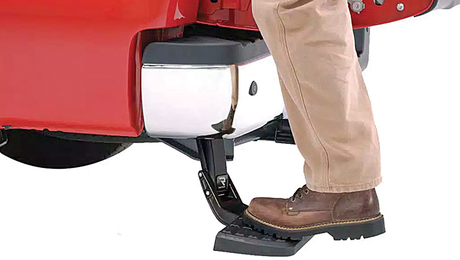a few years back, I purchased a small bungalo built in the 30’s or 40’s
– one floor with a basement. The basement walls are damp and a humidifier makes the basement livable/workable but I would like to seal the basement walls. Is it better to seal from the outside or inside? I am thinking it may be better to dig around the foundation and seal.
Would appreciate your comments
Discussion Forum
Discussion Forum
Up Next
Video Shorts
Featured Story

The RealTruck AMP Research Bedsteps give you easy access to your truck-bed storage.
Featured Video
SawStop's Portable Tablesaw is Bigger and Better Than BeforeHighlights
"I have learned so much thanks to the searchable articles on the FHB website. I can confidently say that I expect to be a life-long subscriber." - M.K.














Replies
Are the walls damp from moisture moving through the walls from damp earth.
Or are they moist be cause the air is humid and the walls are realatively cool?
Where are you located.
Cut a 1 ft square of plastice sheeting and tape it to the wall with duck tape so that all edge are sealed.
Then remove it after 24 hours. If there is water beads or even just a dark square then the problem is moisture moving through the walls.
.
A-holes. Hey every group has to have one. And I have been elected to be the one. I should make that my tagline.
The moisture is definitely coming through the walls, even though grading around the house is good and downspout water is carried at least 10 feet away from the foundation. I'm in Toronto.
You can't seal walls from the inside. If you even try, all that does is hold moisture inside the wall which, in turn, causes even more problems. You have basically two choices:
1) Keep water from coming into the wall. In some instances (but not often), all that involves is diverting water away from the foundation with proper slopes, downspouts, drainage, etc. Usually, it involves digging and sealing the foundation using any of various methods like foam sheeting, elastomeric coatings, etc. and installing properly designed perimeter drains. Not cheap, but very effective.
2) Allow water to continue to seep through the wall, but divert it once it reaches the inside by installing an interior french drain. If the wall is a block wall, this involves drilling weep holes in the bottom blocks and installing an interior drain. An interior drain involves digging a trench around the inside perimeter and installing perf pipe in the trench leading to a sump or exiting to the outside, depending on topography. Usually, a plastic sheet is then affixed to the interior wall to divert any water getting through into the drain. The drain trench is then backfilled and covered.
I hate interior french drains. They treat the symptom, IMHO, and don't solve the problem -- which is almost always a poorly designed foundation system.
Mike Hennessy
Pittsburgh, PA
Agree with just about everything you said, but a lot of codes require both interior and exterior drains. Bottom line is that if the post gets the water away from the house and he dosen't have ground water comming thru the slab thats the way to go; exterior drain. Have a good one.
"thats the way to go; exterior drain"
Exactly. But, 9 times out of 10, the HO "can't swing the bucks to do it", so they elect to just do the interior drain. That's something I never understood -- somebody who can afford $5K to do a half-a$$ed job (IMHO), but not $10K to just do it right the first time. My advice to them is "save up!" To paraphrase a saying I've seen on here several times, "If you can't afford to do it right the first time, how are you going to afford to RE-do it right later?"
As for code, I didn't think this was new construction so, unless there is something special in the local code requiring it, I don't think the poster would be required to install both drians if he decided to go for one or the other.
Mike HennessyPittsburgh, PA
I think you are refering to what used to be my signature until it was hijacked on other forums.."If you don't have the time to do it right, where will you find the time to do it over", just enough sarcasm! Have a good one.
"I think you are refering to what used to be my signature until it was hijacked on other forums."
Yepper. I just couldn't remember who's tag that was! Seems to fit this problem to a "T".
Mike HennessyPittsburgh, PA
No offense, but I don't think you invented that phrase. I've heard it for years as "never time to do it right, always time to do it over."
I didn't claim I invented the phrase, thats why it has quotation marks on it. All I can say is I've been using it for 35+ years. BTW I don't have a clue where the original came from.
Sorry, I misunderstood. I thought when you said the phrase was hijacked on other threads you meant that someone stole it from you.
Kinda like... "I've got no time to stop and sharpen my ax, I've got too many trees to cut"!!!
To me it is just coutesy when someone is using a quote for a signature not to [HIGHJACK?] it for your own signature; bottom line is that quotes belong to no-one. Have a good one.